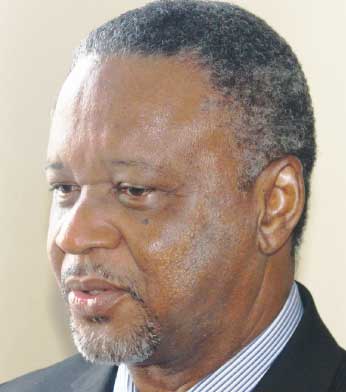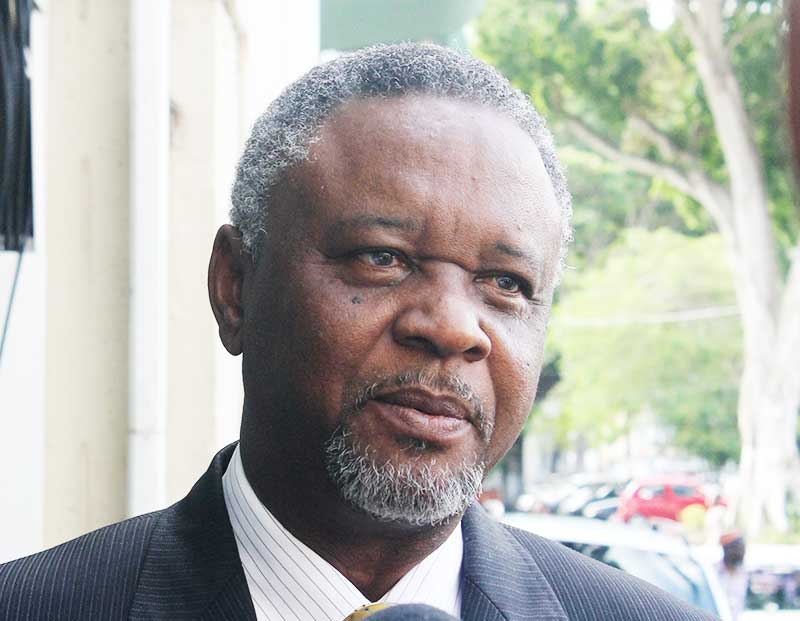DESPITE not providing figures, National Security Minister, Hermangild Francis, said the country is experiencing a reduction in certain offences so far this year, including robberies.
However with 26 homicides to date this year, criminals, he said, will not be allowed to take over the streets.

“We are fighting back and will not allow criminals to take over our streets,” Francis told reporters this week.
“When you look at the number of homicides and categorized it, it is not as high as you are talking about. Twelve of them are from domestic violence. These are matters you cannot stop, so you need to take everything in context,” Francis said.
He said some of the homicide cases for the year are gang-related: “Most of the persons who have died are known individuals to the police. They are very well known.”
The Minister said daily police patrols conduct covert and overt operations in the Castries basin.
“We can’t tell you exactly how we are going to do it but there are police officers on the streets, with almost 50 police officers assigned to the Castries basin patrolling on a daily basis to make sure we can curb some of the incidents of crime,” Francis said.
The patrols are bearing fruit as officers have arrested certain persons of interest in connection with some of the crimes making news recently. Some of those persons have been processed by police while others have been released.
“We are working with other countries as well. I can mention Jamaica. I am in discussion with the Minister over there so that some police officers can come and do a review of what our investigative skills are and where the shortages are, so we can do the necessary arrangements,” the Minister said.
He added that the crime situation in the country needs attention from not only the police but the citizens as well and spoke of the difficulties in getting witnesses to criminal offences to come forward.
“Sometimes the difficulty is to get the witnesses to come forward and you know our society at this time,” Francis said, adding that government is working on a witness protection programme for the country to ensure the safety of witnesses.
“It is not an easy sell,” Francis said, referring to the witness protection programme, “because when you do send somebody overseas, we have to make sure they get housing. If the person has children, we have to relocate the children, and we have to send a monthly stipend. It is not an easy thing but we are working assiduously in getting that sort of facility available to our people so that they could relocate when the opportunity comes about.”
On the question of the investigation of police officers by a team of experts from CARICOM Implementation Agency for Crime and Security, best known as IMPACS, Francis said he was looking forward to a speedy resolution of the matter.
“As you know, the Americans have stopped training our police officers and that’s why I really want to see a speedy decision on the IMPACS report,” Francis said.
Another reason why he wants a speedy end to the IMPACS matter is to get senior officers into the FBI’s courses on management, which he said are necessary for them.
“I think our senior officers need that sort of training, so we are working and going to develop a lot of training,” Francis said.
The Minister is now the Chairman of the Regional Security System (RSS) and is looking to collaborate with IMPACS to provide training in intelligence and terrorism to officers of the Royal St. Lucia Police Force.
The Regional Security System is an international agreement for the defence and security of the Eastern Caribbean region. It was created in 1982 to counter threats to the stability of the region in the late 1970s and early 1980s.
















“Despite not providing figures” , it is alleged that there has been a reduction in crime. Crime analysis studies criminal activity and police function to improve performance. This analysis is critical in assessing effectiveness of operations, allocation of resources and program evaluations. These tasks require high levels of statistical literacy. Crime analysis focuses on the need for specifying and understanding problems and prioritizing responses. Without accurate data it is impossible to access what works for preventing and controlling crime. There needs to be a different approach to reduce crime and prevent recidivism.
Dear Minister i think its better to have stayed home instead of approaching the nation on such an important such as crime without backing your statement with figures! The sad thing is I think you know that! Responsibility and respect demands that. It is with this in mind I ask you Mr Minister “what did you come out to do?”
As per the National security Minister, twelve homicides were linked to “Domestic Violence” incidents and in his own words “these matters you cannot stop, so you need to take everything into contex” One of the most common forms of violence against women is that performed by a husband or intimate partner. The fact that women are often emotionally involved with and economically dependent on those who victimize them, has major implications for both the dynamics of abuse and the approaches to dealing with it. Domestic violence affects the entire family especially children. The original statement by the Minister “these matters you cannot help” suggests that there is no sense of urgency to combat domestic violence. The assumption is that it is futile to allocate resources to combat domestic violence. Children who are exposed to domestic violence become fearful, anxious, withdrawn and have problems with forming attachments and bonding. They are starved for attention, affection and approval. When social bonding is weakened or broken criminality and delinquency occurs. Witnessing domestic violence is the single best predictor of juvenile delinquency and adult criminality. It is also the number one reason children run away.